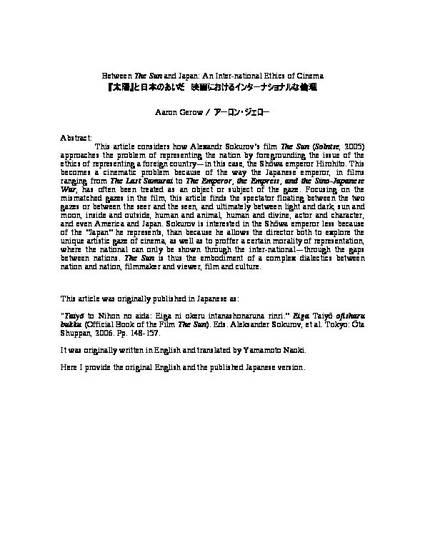
Contribution to Book
Between The Sun and Japan: An Inter-national Ethics of Cinema / 『太陽』と日本のあいだ 映画におけるインターナショナルな倫理
Eiga Taiyō ofisharu bukku
(2006)
Abstract
This article considers how Alexandr Sokurov’s film The Sun (Solntse, 2005) approaches the problem of representing the nation by foregrounding the issue of the ethics of representing a foreign country—in this case, the Shōwa emperor Hirohito. This becomes a cinematic problem because of the way the Japanese emperor, in films ranging from The Last Samurai to The Emperor, the Empress, and the Sino-Japanese War, has often been treated as an object or subject of the gaze. Focusing on the mismatched gazes in the film, this article finds the spectator floating between the two gazes or between the seer and the seen, and ultimately between light and dark, sun and moon, inside and outside, human and animal, human and divine, actor and character, and even America and Japan. Sokurov is interested in the Shōwa emperor less because of the “Japan” he represents, than because he allows the director both to explore the unique artistic gaze of cinema, as well as to proffer a certain morality of representation, where the national can only be shown through the inter-national—through the gaps between nations. The Sun is thus the embodiment of a complex dialectics between nation and nation, filmmaker and viewer, film and culture.
Keywords
- Alexandr Sokurov,
- Hirohito,
- Japanese emperor,
- cinema,
- gaze,
- nation
Disciplines
Publication Date
2006
Publisher
Ota Shuppan
Citation Information
Aaron Gerow. "Between The Sun and Japan: An Inter-national Ethics of Cinema / 『太陽』と日本のあいだ 映画におけるインターナショナルな倫理" TokyoEiga Taiyō ofisharu bukku (2006) p. 148 - 157 Available at: http://works.bepress.com/aarongerow/31/